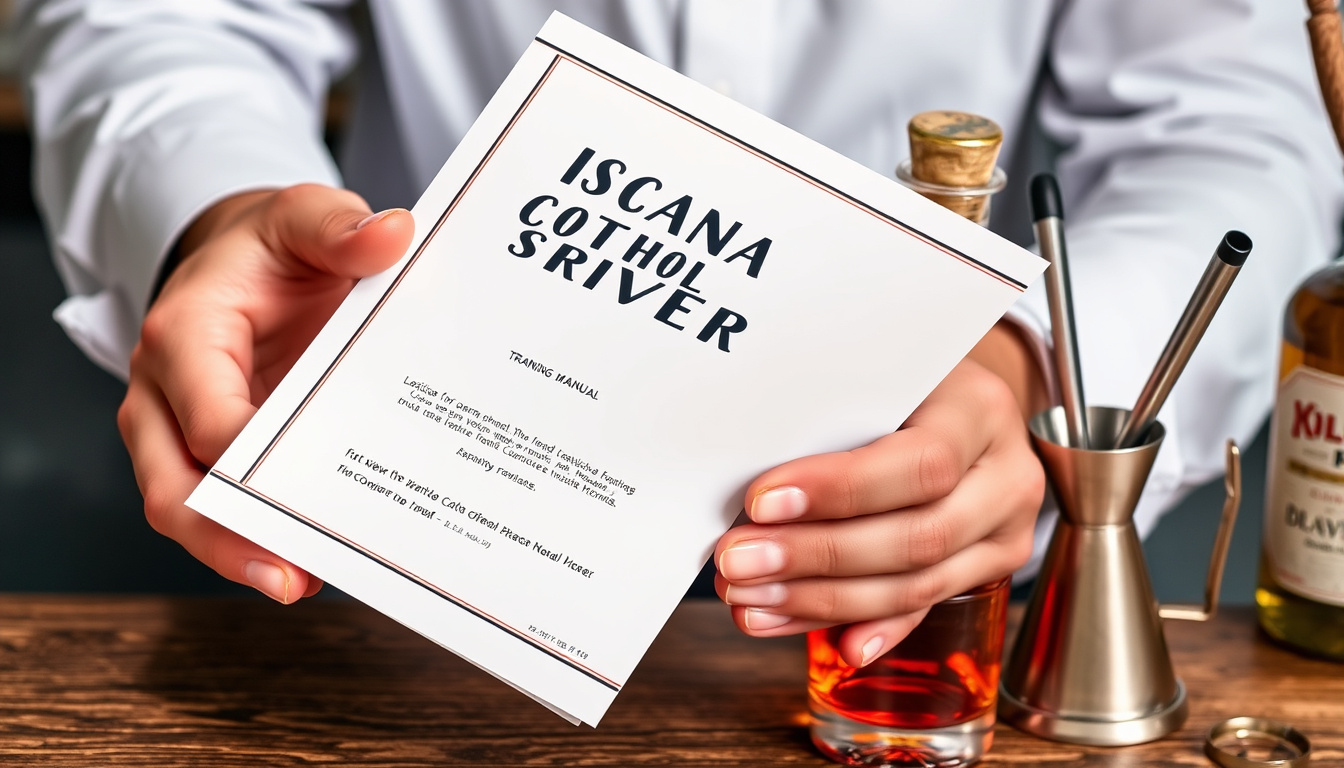
BLOG
For businesses that sell or share alcohol, knowing Louisiana rules is key. You own a bar, restaurant, liquor store, or venue. You follow state rules to keep your license safe and build a secure place to drink. This guide shows the basic rules you need to meet Louisiana alcohol laws.
Understanding Louisiana Alcohol Compliance
Louisiana alcohol compliance means you follow all laws, rules, and licenses related to selling and sharing alcohol. The state watches these rules to stop illegal sales to kids or overly drunk people. The Louisiana Office of Alcohol and Tobacco Control (ATC) and local groups check your work.
Not following these rules can bring fines, a license stop, or losing the license. Every business needs to know these laws well.
Licensing Requirements for Louisiana Alcohol Sales
A first step for compliance is to get the proper license or permit. The state gives different licenses for different businesses and types of drinks. Common licenses include:
- Retail Dealer’s Permit: Use this if you sell alcohol for use off-site (like in a liquor store).
- Retail On-Premises Permit: Use this if you sell alcohol that customers drink on your site (like in a bar or restaurant).
- Distributor’s Permit: Use this if you send alcohol to retailers.
- Manufacturer’s Permit: Use this if your business makes drinks (for breweries, wineries, or distilleries).
Each license has its own rules, fees, and steps. It is very important for your business to use and keep the correct license.
Age Restrictions and Verification Procedures
Age rules are a big part of compliance. In Louisiana, you must be 21 or older to drink. It is against the law to share alcohol with anyone younger.
Businesses must do the following:
• Teach employees to check IDs of customers who look under 30 using a driver’s license or passport.
• Not accept fake or expired IDs.
• Refuse service if there is a doubt about the customer’s age.
Regular training on checking IDs helps stop mistakes and keeps your business safe.
Hours of Sale and Server Responsibilities
Louisiana sets specific hours when you can sell or serve alcohol. Make sure your business follows these times. Usually:
• Sell alcohol daily from 6:00 a.m. to 2:00 a.m. for on-site use.
• Sell on Sundays with local limits.
• Follow similar hours for off-site sales; these may change with permit type or location.
Servers must also watch for signs of intoxication and stop serving when needed. Over-serving a drunk person breaks the rules and can cost your business.
Recordkeeping and Reporting Obligations
Good recordkeeping is a key part of compliance. You must keep clear records such as:
• Sales logs
• Purchase invoices
• Inventory reports
• Employee training certificates
• Incident notes for underage or overly drunk patrons
Inspectors from the ATC or local groups may review these records. Good files show your business is following the rules and help keep fines away.

Penalties for Non-Compliance
Not following Louisiana alcohol laws can bring serious trouble. Penalties include:
- Fines – Money penalties that can reach from hundreds to thousands of dollars.
- License Suspension or Revocation – A temporary or permanent stop of your license that may halt your business.
- Criminal Charges – In case of illegal sales or repeated violations, you could face jail time.
Being careful and following compliance steps helps avoid these penalties.
Tips for Staying Compliant with Louisiana Alcohol Laws
To keep your business in line with the rules, try these actions:
• Employee Training: Teach staff about legal duties, safe serving, and checking IDs.
• Stay Updated: Watch for changes from the Louisiana Office of Alcohol and Tobacco Control.
• Maintain Accurate Records: Keep tidy files for every alcohol sale and incident.
• Conduct Internal Audits: Check your business often to find and fix issues.
• Implement Safeguards: Use tools like ID scanners to help enforce age limits and service rules.
These habits will reduce risk and boost your overall compliance.
FAQ About Louisiana Alcohol Compliance
• Q1: What are the different types of alcohol licenses in Louisiana?
A1: Louisiana offers several licenses like Retail Dealer’s Permit for off-site sales, Retail On-Premises Permit for bars and restaurants, Distributor’s Permit, and Manufacturer’s Permit for making alcohol. Each has its own rules.
• Q2: Can a business in Louisiana sell alcohol on Sundays?
A2: Yes, but follow the local limits. Check your local rules as they can be different.
• Q3: What is the legal age to purchase alcohol in Louisiana and how should businesses verify it?
A3: You must be 21 or older. Businesses should check a valid government-issued ID of anyone who looks under 30 and refuse service if you are not sure.
Conclusion
Following Louisiana alcohol rules is a must for any business selling or sharing drinks. Learn the license steps, check IDs carefully, work within the allowed hours, keep clear records, and stay current on rule changes.
By following these steps, your business is safe from legal issues and helps build a safe community. For the best, most up-to-date info, visit the Louisiana Office of Alcohol and Tobacco Control website or talk to law experts.
For more information, see the Louisiana Office of Alcohol and Tobacco Control.

BLOG
In today’s regulated alcohol sales world, becoming an LSB Responsible Vendor matters. Businesses follow rules and teach buyers safe drinking. The Licensed Sales Branch (LSB) program gives training and guidelines. It helps servers, retail workers, and managers know what to do. The program stops legal risks and builds safer communities.
In this article, we explore key rules for alcohol sales under the LSB program. We show how to learn your duties and use best practices. This guide gives clear tips for vendors who must follow the rules and work safely.
Understanding the Role of an LSB Responsible Vendor
An LSB Responsible Vendor is a licensed business or person. That person ends training and follows the LSB protocols. They do not sell to minors. They do not serve already drunk people. They keep good records. The goal is to support honest alcohol sales.
The LSB program covers:
• Legal rules for selling alcohol
• Ways to spot fake IDs and drunken signs
• How to say no politely
• Record-keeping and reporting tasks
• Best checks on customer habits
Using these rules, the program helps vendors cut alcohol harms and protect their community.
Key Strategies for Effective Alcohol Sales Compliance
1. Comprehensive Staff Training
Vendors must train every worker who handles alcohol. This rule covers servers, bartenders, cashiers, and managers. Training must update with new LSB rules.
• Teach workers to spot signs of drunkenness
• Show the legal risks of bad sales
• Use role-play to build confidence in saying no
• Use videos, quizzes, or interactive tasks
When staff feel strong in their skills, they work with care.
2. Verification of Customer Age Using Reliable Methods
Vendors must check the age of every alcohol buyer. This step stops sales to minors.
• Ask for government-issued photo IDs
• Train workers to find spot-on IDs and fake ones
• Use scanning devices when allowed
A zero-tolerance rule on missing IDs helps vendors stick to the law.
3. Identify and Refuse Service to Intoxicated Customers
Selling to someone visibly drunk is both illegal and dangerous. Vendors learn to see signs of intoxication and to refuse service.
• Look for slurred speech and clumsy movements
• Train on firm yet calm refusal methods
• Stay polite even when saying no
• Write down refusals if LSB rules ask for it
This practice keeps both the business and the public safe.
4. Maintain Proper Documentation and Reporting
Good records show a business has followed the rules. Vendors must track:
• Dates of most recent staff training
• Reports of when sales were refused
• Records of audits or LSB inspections
Regular self-checks and quick reports of mistakes show a true commitment to the rules.
5. Implement Clear Policies and Standard Operating Procedures (SOPs)
Each vendor must write down clear rules. These rules set roles and tasks that meet LSB standards.
• Write clear steps for checking age, saying no, and handling fights
• Summarize training routines for new and returning staff
• Set up easy ways to share problems or rule breaks
Good documents help all workers follow the same plan and lower mistakes.
Benefits of Being an LSB Responsible Vendor
Following the LSB program brings many rewards:
• Legal protection: Lowers risks of fines or license loss
• Community trust: Builds your good name as a safe seller
• Safer environment: Cuts alcohol accidents and incidents
• Enhanced staff confidence: Lets workers act smart and safe
These benefits help alcohol sellers run a steady and respectful business.
Practical Tips for Maintaining Ongoing Compliance
Here are practical steps to stick to LSB rules:
- Hold regular training updates for all staff.
- Post reminders about alcohol laws in employee areas.
- Do regular reviews and role plays at work.
- Create an open space for staff to share worries without fear.
- Keep up with LSB rule changes and update your plans fast.
FAQ Section
Q1: What does it mean to be an LSB Responsible Vendor?
It means you are a licensed seller who has finished the required training. You must follow the rules to avoid unlawful sales, like selling to minors or drunken people.
Q2: How can I verify a customer’s age effectively under LSB rules?
Ask every buyer for a government-issued photo ID if they look young. Train your staff to spot real IDs and spot fakes.
Q3: What are common reasons an LSB Responsible Vendor might lose compliance?
You may lose compliance if you sell to minors or intoxicated people, if you fail to keep training records, or if you do not log refusals. Regular training and clear rules can help stop these problems.
Conclusion
Becoming and staying an LSB Responsible Vendor is more than having a license. You must train your team, check buyers’ ages, say no when needed, and keep good records. Using these clear steps, alcohol sellers can follow the law, protect people, and build a safe drinking culture. Stay informed and act quickly to keep in good standing with the Licensed Sales Branch. For more details, visit the LSB website to get the latest training and program guides (source).


BLOG
When it comes to alcohol service that is responsible, Louisiana alcohol server training matters a lot. Servers learn legal duties and best steps to keep places safe. Whether you work as a bartender, waiter, or manager in Louisiana, this training helps you protect customers and shields your business from risk. This guide gives tips for service that is responsible. It shows why Louisiana alcohol server training is key and what you need to know to excel.
Understanding Louisiana Alcohol Server Training Requirements
Louisiana’s laws require alcohol server training. The law helps reduce risks like drunk driving, underage drinking, and violence. Anyone who serves or sells alcohol must complete a certified training program.
Who Needs Training?
- Bartenders
- Waitstaff who serve alcohol directly
- Managers and supervisors who oversee service
- Anyone who distributes or sells alcohol in establishments
Completing this training proves you follow state laws and care about safety and professionalism.
Key Components of Louisiana Alcohol Server Training
The training covers many important topics. It builds the skills you need for responsible service.
1. Recognizing Intoxication Signs
Servers learn to spot signs of intoxication. They look for slurred speech, poor coordination, and aggressive behavior. Early recognition lets servers act quickly to prevent over-serving.
2. Checking Identification
Servers learn to check identification because underage drinking is a big concern. The training shows how to spot fake IDs and verify age using careful strategies.
3. Legal Responsibilities
The course explains Louisiana laws. It covers penalties for overserving, illegal sales, and serving minors. Knowing these laws helps servers avoid mistakes that can cost money.
4. Responsible Service Techniques
Servers learn techniques for handling tough situations. They learn to refuse service politely, manage hostile customers, and offer non-alcoholic choices.
5. Preventing Alcohol-Related Accidents
The training stresses the need for safe transport options. It builds skills in communication to reduce risks like drunk driving.
Why Louisiana Alcohol Server Training Matters
Training helps not only those who serve alcohol but also the wider community.
- It protects public safety by reducing alcohol-related accidents.
- It cuts legal risks since trained staff lower the chance of law violations.
- It improves customer experience by creating a safe and welcoming space.
- It strengthens your business reputation and helps attract more customers.
The Louisiana Office of Alcohol and Tobacco Control shows that proper training leads to fewer incidents and better community ties.
Essential Tips for Responsible Alcohol Service in Louisiana
Your training is the start. To serve responsibly, you must use the skills you learn every day.
1. Always Ask for Proper ID
Ask every customer for a valid, government-issued ID if they look under 30. This habit helps protect your establishment.
2. Monitor Customers’ Consumption
Watch guests’ drink amounts carefully, especially during rounds or open tabs. Act when someone shows signs of intoxication.
[h3]3. Use Non-Alcoholic Alternatives[/h3]
Offer water, soda, or another non-alcoholic drink. This suggestion helps slow down alcohol consumption without causing offense.
[h3]4. Communicate Clearly and Calmly[/h3]
When you must refuse service, do it clearly and in a calm way. Explain your duty and concern for safety. This approach can ease tension.
5. Know Your Establishment’s Policies
Learn your employer’s rules for serving alcohol. Know the limits on drinks and what to do with problem situations.
Implementing Best Practices: A Checklist for Servers
Use this checklist to put your training into action:
- Verify the customer’s age using valid ID each time they order alcohol.
- Watch all customers for clear signs of intoxication.
- Politely refuse service when a customer is visibly intoxicated.
- Offer water or non-alcoholic drinks.
- Do not serve many drinks at the same time to one customer.
- Document any incidents or refusals following your establishment’s guidelines.
- Advise customers to choose safe transport like rideshares or taxis.
- Keep up to date with current laws and training changes.
[h2]Helpful Resources for Louisiana Alcohol Servers[/h2]
Staying informed helps you keep improving and follow the rules. Look at these resources:
- Louisiana Office of Alcohol and Tobacco Control (ATC): Find the latest laws and licensing tips.
- Louisiana Responsible Vendor Program: Get certified training and updates.
- National Restaurant Association’s ServSafe Alcohol: Receive well-recognized alcohol server training.
FAQ About Louisiana Alcohol Server Training
Q1: How long is Louisiana alcohol server training valid?
A: The training is usually valid for two years. Check with your provider or the Louisiana ATC for current rules.
Q2: Is the training required for all employees who handle alcohol?
A: Yes. Everyone involved in serving or handling alcohol in a licensed place must complete the training.
Q3: Can the training help reduce legal risks for establishments?
A: Yes. Proper training informs staff of rules and helps them avoid overserving or illegal sales. This knowledge lowers legal risks.
Conclusion
Louisiana alcohol server training builds a solid base for everyone who serves alcohol in the state. By teaching skills like age verification, spotting intoxication, understanding legal duties, and using responsible service techniques, the training helps keep everyone safe. Use these best practices every day and update your knowledge to stay compliant. By serving responsibly, you support community safety and boost your establishment’s success.

For more details and to find certified training programs, visit the Louisiana Office of Alcohol and Tobacco Control.

BLOG
In today’s competitive job market, you must learn specialized skills to unlock career opportunities. LSB-RVT training grows fast; it gives you knowledge and hands-on practice in radiologic technology and sonography. This training opens many employment doors. It also promotes professional growth. In this article, we outline what LSB-RVT training is, list its benefits, and show how it lifts your career.
Understanding LSB-RVT Training: What It Is and Why It Matters
LSB-RVT training means approved educational plans by the Louisiana State Board of Radiologic Technologists. It is made for Radiologic and Vascular Technologists (RVT). The training builds key skills for diagnostic imaging and vascular sonography. It helps you improve clinical skills and theory quickly.
LSB-RVT training matters because it follows state rules and industry standards. Students study anatomy, ultrasound physics, patient care, and advanced imaging. Completing the training makes you eligible for certification tests and licensure. These credentials count in the healthcare sector.
Career Paths Enhanced by LSB-RVT Training
With LSB-RVT training, you can explore many career options in healthcare and diagnostic services. Some roles include:
- Diagnostic Medical Sonographer: You use ultrasound machines to get images and data.
- Vascular Technologist: You image and check the circulatory system for problems.
- Radiologic Technologist: You perform imaging tests like X-rays or MRIs to help doctors diagnose.
- Healthcare Facilities: Hospitals, clinics, outpatient centers, and imaging centers need skilled technologists.
- Research and Education: Experienced RVTs might train new students or join clinical research teams.
The healthcare field grows fast. It needs diagnostic experts. Trained individuals often find high demand, good salaries, and career progress.
Components of a Comprehensive LSB-RVT Training Program
A good LSB-RVT training program mixes classroom work, hands-on practice, and exam review. Key parts include:
- Foundational Knowledge: Learn anatomy, physiology, patient positioning, and medical ethics.
- Imaging Physics and Instrumentation: Study ultrasound physics, manage equipment, and keep safe.
- Clinical Techniques: Practice imaging techniques like Doppler ultrasound and vascular sonography.
- Patient Care and Communication: Build skills to interact with and comfort patients during tests.
- Regulatory and Professional Standards: Learn legal rules, licensing steps, and ongoing education.
- Certification Exam Preparation: Review sessions focus on national and state tests.
This approach makes sure graduates face both technical and patient challenges well.

Benefits of Enrolling in LSB-RVT Training Programs
LSB-RVT training gives more than technical skills. It boosts career growth, credibility, and networking. Benefits include:
- Accredited Certification: Certification by groups like the American Registry for Diagnostic Medical Sonography (ARDMS) improves your job chances.
- High Employability: The need for diagnostic technologists creates many jobs.
- Competitive Salary: Certified RVTs get pay that matches their expertise.
- Career Versatility: Training lets you choose many specializations in healthcare.
- Continuing Education Opportunities: It lays the base for advanced roles.
- Professional Network: Connect with experienced teachers and peers for mentorship and career advice.
Investing in LSB-RVT training is a smart move. It helps you shine in healthcare and move forward steadily.
How to Choose the Right LSB-RVT Training Program
Choosing the best LSB-RVT training program means checking several important points:
- Accreditation: Make sure the program is approved by the Louisiana State Board of Radiologic Technologists.
- Curriculum Depth: Find programs that cover vascular sonography and radiologic technology fully.
- Clinical Affiliations: Check if you can get hands-on experience with experts.
- Instructor Credentials: Look for teachers with real industry experience.
- Flexibility: Choose formats that match your schedule, such as part-time or online.
- Certification Success Rates: Research the program’s results for passing exams.
- Student Support Services: Good career counseling and job help boost your success.
These factors help you pick a program that fits your career goals and learning style.
Steps to Enroll and Succeed in LSB-RVT Training
Start your LSB-RVT training journey with these clear steps:
- Research Programs: Use websites and contact schools to learn about training options.
- Meet Prerequisites: Ensure you have a background in healthcare or a related field.
- Apply to Programs: Submit the right forms, transcripts, and recommendation letters.
- Secure Financial Aid: Look for scholarships, grants, or student loans for healthcare training.
- Engage Fully in Classes: Join all classes, labs, and clinical sessions to build your skills.
- Prepare for Certification: Use review courses and practice tests to ready yourself.
- Network Professionally: Attend events, join groups, and connect with mentors to expand your career.
Following these steps carefully will help you land a rewarding career with LSB-RVT training.
Frequently Asked Questions about LSB-RVT Training
What is the duration of an LSB-RVT training program?
Most training programs last between 12 and 24 months. The length depends on whether you study full-time or part-time and on other requirements. They balance classes with hands-on work well.
Can LSB-RVT training be completed online?
Some parts of LSB-RVT training are delivered online. But because diagnostic imaging needs practice, you must complete clinical sessions in person. This ensures you learn proper techniques.
Is certification mandatory after completing LSB-RVT training?
Yes, certification is usually required. You must get certified by groups like the ARDMS or through state boards to work professionally. Certification shows you follow industry standards and are competent.
Conclusion
Career opportunities in healthcare are within reach through LSB-RVT training programs. This training gives you the tools to build strong technical skills and the ability to care for patients well. By choosing an accredited program and preparing carefully, you can secure a rewarding career and succeed in a competitive job market.
For more information on state licensure and recommended training programs, visit the Louisiana State Board of Radiologic Technologists website or check with related professional organizations.
Embark on your LSB-RVT training today. Transform your future with focused education and practical skills.

BLOG
In today’s market, trust matters. You earn trust with customers and partners. Responsible vendor certification builds that trust. It shows you act with ethics and care. It also opens new doors for your business. In this guide, we explain how certification helps you, list the steps you take, and show the boost it gives your business.
What Is Responsible Vendor Certification?
Responsible vendor certification gives a company clear praise. It shows that the firm meets ethical, social, and environmental standards. It tells customers, partners, and clients that you follow fair labor practices, protect the environment, and obey laws.
Third-party experts often check these claims. Certified companies prove they act with care and transparency. This status relies on close connections between your work and values.
Why Responsible Vendor Certification Matters for Your Business
Securing this certification can change your business in many ways. Here are the key points:
-
Builds Customer Trust
Buyers like clear proof of ethics. Certification links your business practice with trust.
-
Meets Compliance and Regulatory Requirements
Many sectors require strict rules. Certification shows you meet or beat these rules.
-
Differentiates Your Brand
In a crowded market, you need to stand out. Certification ties your brand to ethics.
-
Expands Business Opportunities
Big companies and governments require ethics checks. Certification can be a key that unlocks larger deals.
-
Improves Supply Chain Transparency
The process makes you look at your supply chain. You reduce risks and gain efficiency.
How to Get Responsible Vendor Certification: Step-by-Step
Follow these clear steps to earn certification.
Step 1: Understand Certification Standards and Requirements
Start by learning the rules. Different bodies use varied standards for labor, environment, and sourcing.
Look at well-known guidelines such as:
- ISO 20400 (Sustainable Procurement)
- Ethical Trading Initiative (ETI) Base Code
- SA8000 Social Accountability International Standard
Know these early. They help you see what you must fix.
Step 2: Conduct a Comprehensive Internal Assessment
Do a careful review of your work. Check your labor policies, environmental systems, and legal compliance. Look at how you work with suppliers.
Record your findings and note gaps.
Step 3: Implement Necessary Improvements
Make changes based on your review. Improve worker safety and fair policies. Use greener methods. Increase transparency with suppliers.
Work with your team and partners to meet these needs.

Step 4: Prepare Documentation
Collect all proof of your responsible actions. Bring together:
- Policy manuals
- Training records
- Audit results
- Environmental reports
Clear documentation speeds up the process.
Step 5: Apply for Certification and Schedule an Audit
Submit your application with all paperwork. The certifiers then plan an onsite or remote review. They check your practice and documents.
Step 6: Receive Certification and Maintain Standards
Once you meet the rules, you get certified. But work does not stop here. Keep improving by holding regular audits and updates.
Key Benefits of Responsible Vendor Certification in Numbers
A 2023 Nielsen survey shows 73% of consumers change habits to help the planet. This shows a clear trend.
The numbers speak:
- 25% Increase in Supplier Contracts: Businesses win more deals.
- 40% Boost in Customer Retention: Customers stay longer with ethical vendors.
- 15-20% Reduction in Supply Chain Risk: Clear supply chains mean less risk.
Best Practices to Leverage Responsible Vendor Certification
Certification is only a start. To get the full benefit, try these tips:
- Promote Your Certification: Show it on your website, in your ads, and in your proposals.
- Educate Your Customers and Partners: Explain what certification means.
- Collaborate with Certified Partners: Link up with others who share your ethics.
- Continue Monitoring and Improving: Regularly check and update your policies.
Frequently Asked Questions (FAQs)
1. What industries can benefit from responsible vendor certification?
Many sectors benefit. Think of manufacturing, retail, tech, healthcare, and government. Any business that values supply chain clear rotation and ethics gains from this certification.
2. How long does it take to get responsible vendor certification?
It depends on your size and readiness. Typically, the work takes about three to six months, through audits and changes.
3. Is responsible vendor certification recognized internationally?
Yes. Many certifications use global standards like ISO, so they are known and trusted worldwide.
Final Thoughts: Invest in Your Business Credibility Today
In a market that cares more about ethics, responsible vendor certification is not just an accolade but a powerful tool. It builds trust, opens markets, and protects your business from ethical risks. Each closer link between policy and practice boosts your credibility—and helps build a fair, sustainable world.
Start your journey toward certification today. Let your strong, ethical practices lead you to greater opportunities and lasting success.









